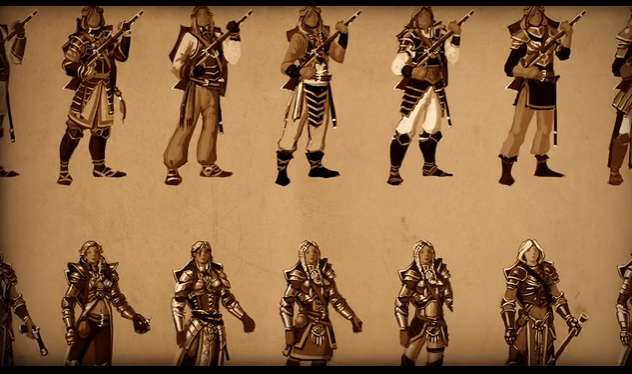I've just watched his video again to be sure. And he didn't mentioned more details in the video, than Obsidian. Not-at-all.
With W2 there was quite a bit more presumed detail and solidity implicit in the pitch, though; even Fargo's little jokey skits emphasised to his audience 1) that he'd wanted to make this particular game for a very long time, and 2) that his team had laid out a clear direction for the project, which 'wouldn't stray too far from the original'. It was actually quite strange that so many people seemed to be confused about the basic shape of the game (like the forum-posters Brother None mentioned earlier, who were horrified when they found out about the full party creation, accused Fargo of lying to them, and ranted at length about 'robotic' PCs) because even if you hadn't played W1, it only took thirty seconds to go onto Youtube and see the main frame of reference for yourself.
This project, rightly or wrongly, I think really has come across initially as less clear in its intent and shakier in its identity. PE has a generic (work-in-progress?) title; there've been three games referenced as equally important influences, but they're all very disparate, they all take place in a different universe with a different ruleset, and they've all been referenced as qualitative buzzwords ('Project Eternity will have the emotional writing of Planescape Torment!', etc) which makes it hard to figure out if any of them can be treated as useful rough guides to the intended tone. And while I'm pretty sure the '
we have some awesome ideas for playable races and classes but we'd like you to give us your ideas for them first!' shtick is mainly an effort to make the fans who've backed the game feel included and encourage them to use the forums, the way it's worded makes Obsidian look as if they don't have much of a direction for the game (if they haven't already provisionally pencilled in the main races that populate the gameworld, then how can they have decided anything about the setting, full-stop? Did they just fill in random place-names on that map?). It makes the whole thing feel a bit reactive and rushed, not as if they're using Kickstarter to develop that rock-solid pitch nobody wanted, which George Ziets speculated was going to be the case.
Old man Fargo played up his passion for the actual product from the very beginning, in his video and the interviews, which was savvy; he didn't just list his credentials or make a few jabs at consoles and publishers, he hammered home the message that Wasteland 2, specifically, was a game he'd been dying to make for donkeys' years, which plays nicely into the Kickstarter narrative in which the developer gets to work on their labour-of-love unhindered by them corporate types. Obsidian, by contrast, haven't really put across their enthusiasm for the thing itself, as opposed to enthusiasm for making some kind of mature-rated isometric party-based fantasy RPG, with their initial burst of publicity. Aside from something not immediately inspiring to do with magic and souls, they've been pitching the genre over the possibly-as-yet-untitled game.
I dunno. It's quite interesting to read Sawyer blogging about his general design philosophy, but it might calm a few frayed nerves here and elsewhere if he does post tomorrow with something to indicate at least a basic individual identity and direction for the project beyond 'A game similar to those games people liked in all the good ways, but without the licence'.





























![Have Many Potato [2013] Codex 2013](/forums/smiles/campaign_tags/campaign_potato2013.png)
![The Year of Incline [2014] Codex 2014](/forums/smiles/campaign_tags/campaign_incline2014.png)






